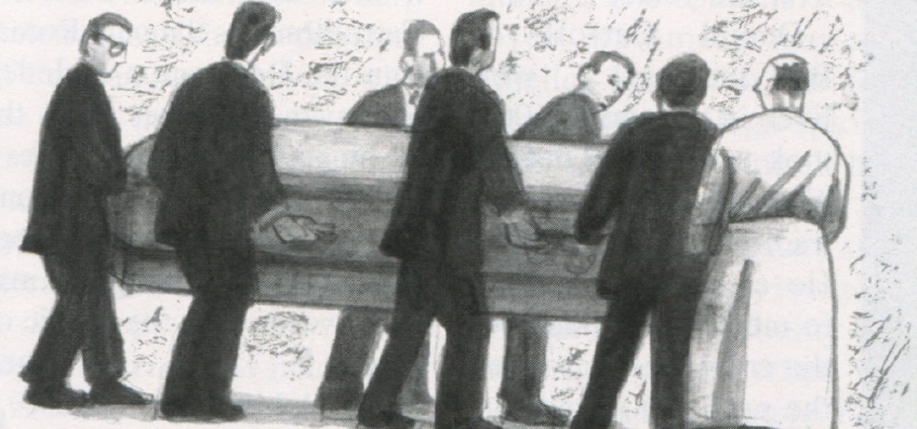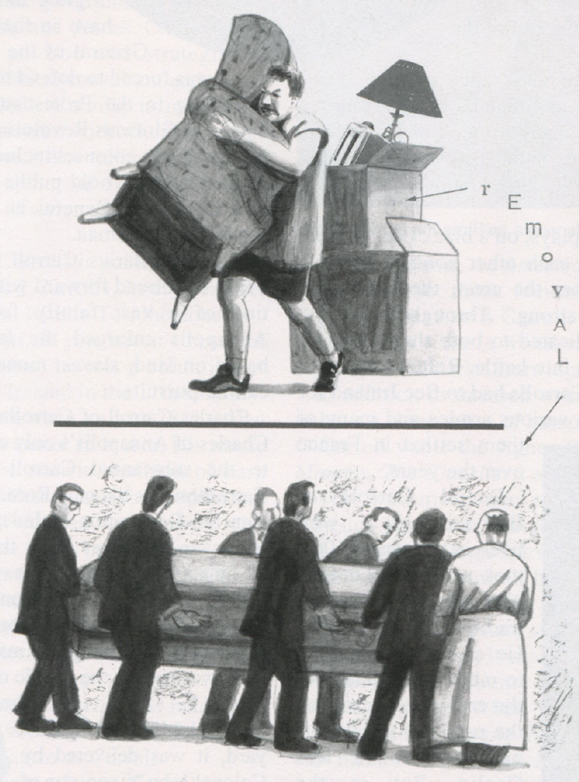Somewhat Removed.
There was death in Roscommon Town tonight. The street outside Smith’s Funeral Home (which occupies a sad plot opposite the local livestock mart) was packed with cars. As I threaded my way through the crowd, I recognized a few neighbors who were going in. We waved, and I felt a twinge of shame for passing by on so frivolous an errand as buying cigarettes. But I had no idea who’d died and I guess that’s what sets us apart, as newcomers to Ireland. We might know a few people, but everyone else knows everybody.
When we first moved here we wondered about the funerals. It seemed that whenever we happened upon one it was especially well attended and we thought it odd that so many important people were dying just as we were moving in.
Since then we’ve come to understand that virtually every funeral round here is large because, indeed, everyone is important. In so rural a part of so small a country everyone is, like the knots of a net, connected in vital ways to everyone else.
There is no “six degrees of separation” here; it’s more like three or four. Indeed the most popular Irish parlor game in any social situation is sorting out the relative relationships of anyone whose name arises in the conversation. It’s a pastime that borders on obsession, and you can almost see them fingering the knots of the network. Mention a name like O’Mahoney in a crowded pub and see what happens. It’s like tossing a bloody steak into a pack of ravenous dogs.
“O’Mahoney,” someone is bound to exclaim, “Is that the Ballintober O’Mahoneys?”
“No, from Kiltoom. Gerry, you remember Gerry, the footballer? (It all comes down to sports.) He married Mary Fallon, Jimmy’s second daughter. Her mother was a Lennon from near Boyle way.” And so it escalates. Before you can knock back a shot of Jameson’s whiskey the whole crowd is nose to nose in muttering snarl and they won’t let go til every niece, uncle, and brother-in-law in America is nailed down six ways from Sunday. Try it sometime. It’s great fun to watch.
To be honest, I’m not entirely sure what I saw in town tonight. The actual funeral will undoubtedly be held tomorrow. This was more likely the wake, or maybe what the Irish call “The Removal.” A wake is pretty much what you’d expect; whether it’s held at home, as it most often used to be, or at a funeral parlor as is becoming more common today. The Removal is when the deceased is taken from the wake to the church. It’s no slam-bang affair as it is in the States, for the Removal usually takes place the night before the actual funeral, and the body is placed at the altar to spend its last hours in serene and private fellowship with The Church. It’s a powerfully symbolic ritual made more so by the fact that as many mourners will often accompany the body during its Removal, as will attend the actual service.
You’re likely to see it in any town: the hearse slowly making its way up the street, with a silent throng of black-clad friends and family walking behind. No one is left to make that trip alone, and the gesture of final togetherness never fails to being tears to my eye whether I knew the dearly departed or not.
The problem for outsiders is that the word `removal’ has a second and fundamentally different meaning in this confounded country. A `removal van’ and `removal men’ are what you hire when you’re moving and don’t want to pack up the household yourself. And if there’s stuff left over that’s not going to fit in the new house, you have what they call a `removal sale.’
You can see the potential for confusion.
Shortly after we moved here my wife phoned her elderly cousins who live on the old family farm in Longford. They don’t get out much nowadays, and she worries a lot about them.
“Paddy, how’re you doing?” says she. “It’s Joanne calling.”
“Ah, and we’re tired tonight. We went out to a removal today.”
“Oh Paddy, I’m so glad to hear it! Did you get anything good?”
And so we continue, my delicate bride and I, to be slightly “removed” from the ways of Irish life. There’s a lot we need to learn.
Still I like to think that, as I passed the neighbors tonight, they might have set about that age old custom: fingering the net to find the fresh knot that they may have tied for us. ♦



Leave a Reply